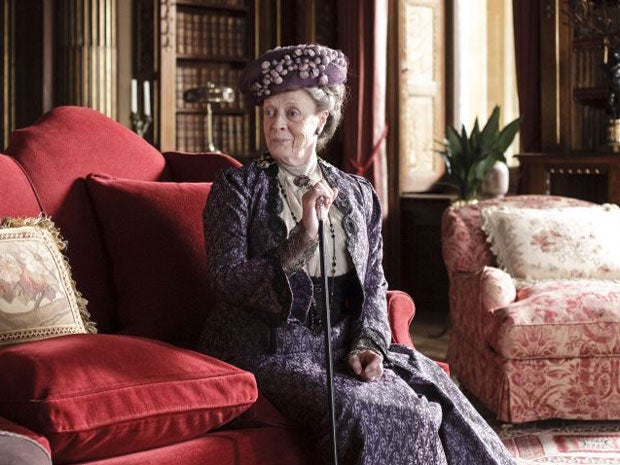No regrets, Dame Maggie: film and TV are the better for you
Missing out on theatre might be painful, but she chose the right path


The most affecting moment at last Sunday’s Evening Standard Theatre Awards was the speech from Dame Maggie Smith when she received a special “icon” award. Dame Maggie is so rarely glimpsed anywhere outside the world of Downton, and virtually never graces awards ceremonies, so all of us there hung on her every word. And they weren’t the words we were expecting.
Close to tears and in a tone full of regret, she said how she felt she had not done enough theatre and now wished she had done more. “I’m very sad because I haven’t done anything in theatre to justify this. I wish I had… I’d love to do more.” Backstage afterwards she had recovered her famously disconcerting humour to add: “I would love to do more theatre work but really, I don’t get any offers. If you could help me put the word out, maybe that would help! Maybe you could put an advert in for me.”
It’s true that it is quite a while since she has been seen on stage. And surrounded by theatre folk as she was on Sunday night it’s not surprising that she was suddenly filled with remorse at the prolonged absence.
But, much as those theatre folk might not like to hear it, in choosing to prioritise film and TV in her middle and later years, Maggie Smith has done the right thing. They are the route to acting immortality (as well of course as a much healthier bank account).
Like it or not, only by embracing popular culture, of which theatre still remains on the periphery, does a fine stage actor gain a mass audience and the immortality that follows. The downside is that that mass audience can think the actor only ever existed in film and TV. The way actor deaths are reported usually betray this, most notably and depressingly when Sir John Gielgud, one of the greatest stage actors of all time, died and many of the headlines mourned the passing of the butler in the Hollywood movie Arthur.
So, those of us who are passionate about theatre may find it hard to imagine that present day stage titans like Mark Rylance and Simon Russell-Beale will be forgotten, but with little screen work to their names, the possibility is that in 50 years they will be.
I’d still say that Dame Maggie, her immortality guaranteed, could and should return to the stage, not least to the National Theatre where, incredibly, she hasn’t acted in a play for decades. But that’s not to imply that she made any wrong career decisions. Despite her momentary and undoubtedly sincere voicing of regret the other night, she did the right thing and future generations will be able to appreciate her remarkable talent because of the choices she has made.
Silence in the mosh pit
A reader, Kevin Sloane, has written to me to say he is a music fan in its widest sense and goes to rock gigs and opera. He finds that increasingly at rock gigs there is a constant chatter from fans and a relentless stream of people pushing past him to get to the bar. He also recounts that when during a quieter number he asked some people to stop talking, he was roundly sworn at. At the English National Opera on the other hand he can hear a pin drop. It’s a tricky one. The experiences of rock and opera are, of course, different. One often likes to watch a gig with a bottle of beer in hand. Nevertheless, I do have some sympathy with Mr Sloane’s point. I just won’t be as brave as him in asking those around me to stop talking, as I know where that bottle of beer will end up.
That way please, ladies (and gents)
I’ve argued that those in high positions in the arts should spend some time at the interface with the public to see what the real concerns of audiences are. But I didn’t expect anyone to take this as literally as the indomitable West End theatre owner and producer Nica Burns. She tells me that during the interval at one performance at the Palace Theatre she stood outside the ladies loo directing women to other ladies toilets she had newly opened and generally helping them beat the queues – indeed she and they took great pleasure in finding that it was, unusually, only the men who were queuing. Let’s see more venue owners doing this. For Ms Burns it had the bonus, as she recounts, that “I can now say I have been a toilet attendant at the Palace.”
Join our commenting forum
Join thought-provoking conversations, follow other Independent readers and see their replies
Comments
Bookmark popover
Removed from bookmarks